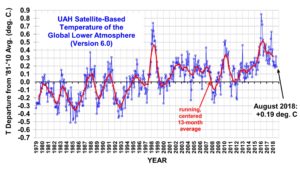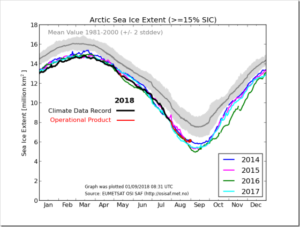by P. Homewood, September 2, 2108 in NotaLofPeopleKnowThat
Something so extraordinary has lately been going on at the other end of the world that, if it did not run so flatly contrary to the prevailing groupthink of our time, it would surely have made big headlines over here.
We may have gathered that there has been something of an earthquake in the politics of Australia, where the prime minister Malcolm Turnbull faced such a revolt by his Cabinet colleagues over “climate change” that he was eventually forced out of office, to be replaced as leader by Scott Morrison.
But the real significance of this has only now come to light with the unveiling by Australia’s new energy minister, Angus Taylor, of the country’s wholly new energy policy, which completely reverses that of the Turnbull government.
…
by Claire Stam, 31 août 2018 in Euratciv/LaTribuneGenève
Alors qu’elle avoue la part de responsabilité de l’Allemagne dans le changement climatique, et carrément au passage, l’échec de la transition énergétique dans son pays, Angela Merkel s’est pourtant exprimée à la télé pour s’opposer aux objectifs climatiques plus ambitieux proposés par l’Union européenne qui cherche à trouver une solution face à un changement climatique de plus en plus rapide. Un article de notre partenaire Euractiv.
…
by P. Homewood, September 2, 2018 in NotaLotofPeopleKnowThat
Global temperatures fell back to 0.19C in August. This means the YTD average is 0.23C, putting them back to roughly where they were in 2002.

Arctic sea ice is tracking close to 2014, which finished with one of the highest minimums in the last decade. Current extent is well above the last three years.

by Andy May, September1 2018 in WUWT
February 15, 2016 was the beginning of an in-depth debate on man-made climate change between two well-known experts in the field, Dr. William Happer and Dr. David Karoly, hosted by TheBestSchools.org. Both have been heavily involved in atmospheric research since the 1980s, but they have landed on opposite sides of the debate.
…
-
Is recent global warming unusual?
-
How do we know the excess CO2, and other greenhouse gases, are from human activities?
-
How do we know that the increase in CO2 and other greenhouse gases in the atmosphere have caused most of the recent global warming?
-
Climate models have been used to compute the amount of warming caused by human activities, how accurate are they?
-
How do we know global warming and more CO2 will have substantial adverse impacts on humans and the planet?
-
Should anything be done to combat global warming?
La géologie, une science plus que passionnante … et diverse


